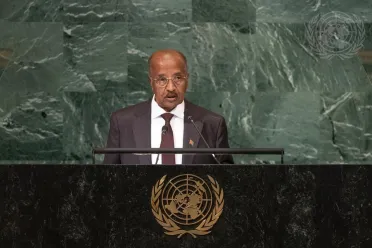Statement
Statement summary
OSMAN SALEH MOHAMMED, Minister for Foreign Affairs of Eritrea, said that the profound, intertwined and multiple challenges the international community is facing are of epic proportion, and — COVID‑19 aside — constitute the cumulative consequences and tell-tale symptoms of a tense and highly flawed global governance architecture. “They are the by-products and manifestations of systemic failure of the unipolar world order that has prevailed for over 30 years,” he said, stressing that it was essentially designed to advance and safeguard the privileges of its principal architects to the exclusion of most other States. “Its rather monolithic and condescending ideological perspective diverts no room to historical context, distinct realities, independent policy choices of other sovereign peoples and nations,” which are instead expected to fully adhere to the golden standards stipulated in the “flimsy” rules-based international order.
Over the past 30 years, the heavy meddling in domestic affairs, imposing of unilateral sanctions and distortion and weaponization of human rights have been derivates of the faulty global governance architecture, he said. It is “ridiculous” that less than 1 per cent of the population owns 99 per cent of global wealth, he said, noting growing consumerism and individualism and their potentially dangerous impacts on social stability, both in individual countries and globally. “Eritrea has bored the burden of this unfair international order through illicit sanctions, the use of surrogate forces to create a situation of permanent conflict and instability [and] the weaponization of human rights to isolate and ostracize the young nation,” he affirmed, calling for urgent remedial action.
He stressed that, as the prevailing global governance architecture has lost legitimacy and corroded vital global equilibrium that is crucial for continuity and sustainability, “our global village and the United Nations system must devise a new international order”. This must be anchored in: consensus with the full, equal participation of its constituencies; equality of all Member States and respect for State sovereignty and political independence; equitable representation of all Member States in all decision- making international bodies through viable mechanisms; a review of the selective and partial parameters that impair collective well-being; and the fostering of a compassionate social system.

